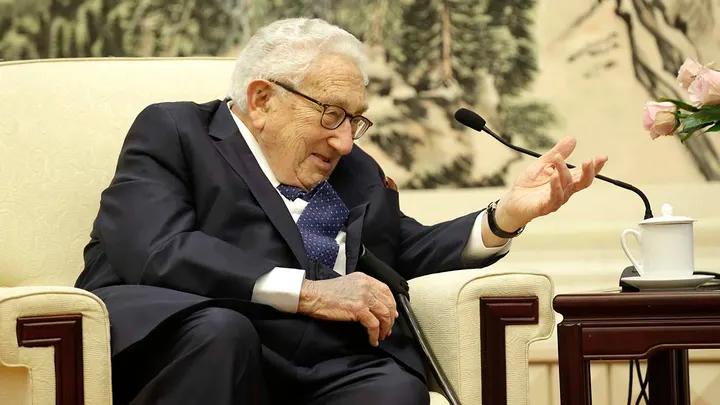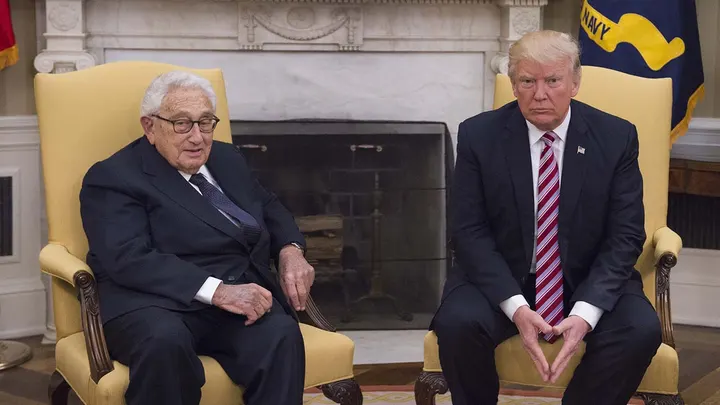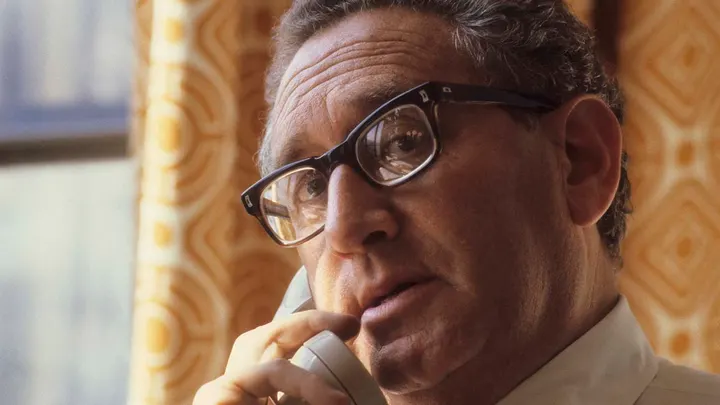Henry Kissinger died at his home in Connecticut

On Wednesday, Henry Kissinger, the German-born American diplomat, academic, and influential presidential adviser, passed away at the age of 100, according to a statement from Kissinger Associates.
Henry Kissinger died at his Connecticut residence. Kissinger, who served as secretary of state for two presidents, had a profound impact on U.S. foreign policy over several decades.
While some praised him as a brilliant strategist, others criticized him as a master manipulator. His legacy is marked by both reverence and controversy.
Henry Kissinger made an indelible mark in diplomatic history, earning the Nobel Peace Prize in 1973 for initiating a policy of détente with the Soviet Union, initiating reconciliation with China, and negotiating the Paris Peace Accords to end US involvement in Vietnam. Despite these achievements, some of his policies continue to stir controversy.
Israel-Hamas war: Biden funds both sides
In 2002, journalist Seymour Hersh asserted, “Henry Kissinger’s dark side is very, very dark.”
In stark contrast to the Hollywood Adonis image, Henry Kissinger, with his portly figure, bespectacled appearance, and distinctive accent, seemed an unlikely figure in the realm of social glamour. However, before his second marriage, according to biographer Walter Isaacson, Kissinger was romantically involved with actresses Jill St. John, Shirley MacLaine, Marlowe Thomas, Candice Bergen, and Liv Ullman.
Reflecting on the allure of power, he famously declared, “Power is the ultimate aphrodisiac.”
As the perpetually in charge Henry Kissinger once quoted in The New York Times in 1969, “There can be no crisis next week; my schedule is already full.” Even after retiring from public life, he retains global influence, exemplified by his meeting with Chinese President Xi Jinping in Beijing in July.

Despite celebrating his 100th birthday less than two months ago, Kissinger enjoyed deep respect from the Chinese leader.
At the time, Xi remarked, “The Chinese people will never forget their old friends, and Henry Kissinger’s name will forever be associated with China-US relations.” Kissinger played a key role in the normalization of diplomatic relations between the US and China under Presidents Richard Nixon and Gerald Ford.
Reflecting on his post-office years in 1980, Kissinger shared with Time magazine, “The longer I’m in office, the less I can do wrong.”
Henry Kissinger married his wife Nancy in 1974 and has two children, David and Elizabeth, from his first marriage.
Born Heinz Alfred Kissinger on May 27, 1923, in Furth, Bavaria, Germany, Henry Kissinger was recognized for his intelligence from an early age. Biographer Walter Isaacson observes, “Henry Kissinger grew up with a unique mixture of ego and insecurity that came from being the smartest kid in class.”
Isaacson also noted, “From knowing that you’re amazingly smarter than anyone else but he’s also been beaten up because of the Jews.”

Henry Kissinger, along with his younger brother Walter and their parents, escaped the Nazis and arrived in New York in 1938 via London when Henry was 15 years old.
Following his time at the City College of New York, he moved to the U.S. Served in the military, U.S. Obtained citizenship, and later studied at Harvard. There, he earned bachelor’s and master’s degrees as well as a Ph.D.
Joining the Harvard faculty, Kissinger became an expert in international relations and President John F. He served as a consultant to government agencies during the Kennedy and Lyndon Johnson administrations.
In 1969, Henry Kissinger took over as National Security Advisor to President Nixon. With the National Security Council in power, Kissinger’s U.S. Played a significant role in the formulation and implementation of foreign policy and exerted considerable influence. During this time, he often spoke with then-Secretary of State William P. Worked independently of Rogers.
As an ardent advocate of realpolitik, Kissinger urged Nixon to adopt a pragmatic approach to rapprochement with the Soviet Union and China. His influence was crucial in shaping the strategic decisions of the administration.
His role in the Vietnam conflict, particularly the bombing of Cambodia and Laos, caused significant controversy. In 1973, Henry Kissinger began secret negotiations with North and South Vietnam that led to the Paris Peace Accords aimed at ending direct US military involvement in Vietnam and ending the war.
Despite the temporary ceasefire, Kissinger was awarded the Nobel Peace Prize that year, sharing the honor with his North Vietnamese counterpart Le Duc Tho. Kissinger expressed humility in accepting the gift, but rejected tho recognition, stating that the agreement had failed to achieve lasting peace.
In his book “The Trial of Henry Kissinger”, the late author Christopher Hitchens alleged that Kissinger supported the September 1973 coup that ousted Chilean Marxist President Salvador Allende, leading to the establishment of the authoritarian regime of General Augusto Pinochet.
On September 22, 1973, Nixon appointed Kissinger as Secretary of State, a position he held when Gerald Ford took over after Nixon’s resignation in 1974 following the Watergate scandal.
Following Ford’s failed reelection bid in 1976, Kissinger left politics and returned to academia, joining Georgetown University’s Center for Strategic and International Studies think tank.
In addition to his varied career, Henry Kissinger founded his international consulting firm, Kissinger Associates, and held directorships on numerous boards for corporations and nonprofit organizations. Beyond his advisory roles, Kissinger authored several books on public policy and wrote three memoirs.
In his 1982 memoir, “Years of Upheaval,” he articulates his view on leadership, “Statesmen create; ordinary leaders consume.” Kissinger emphasizes this distinction, while ordinary leaders may be content to improve existing conditions, a statesman must possess visionary and academic qualities, actively contributing to transformative change.
